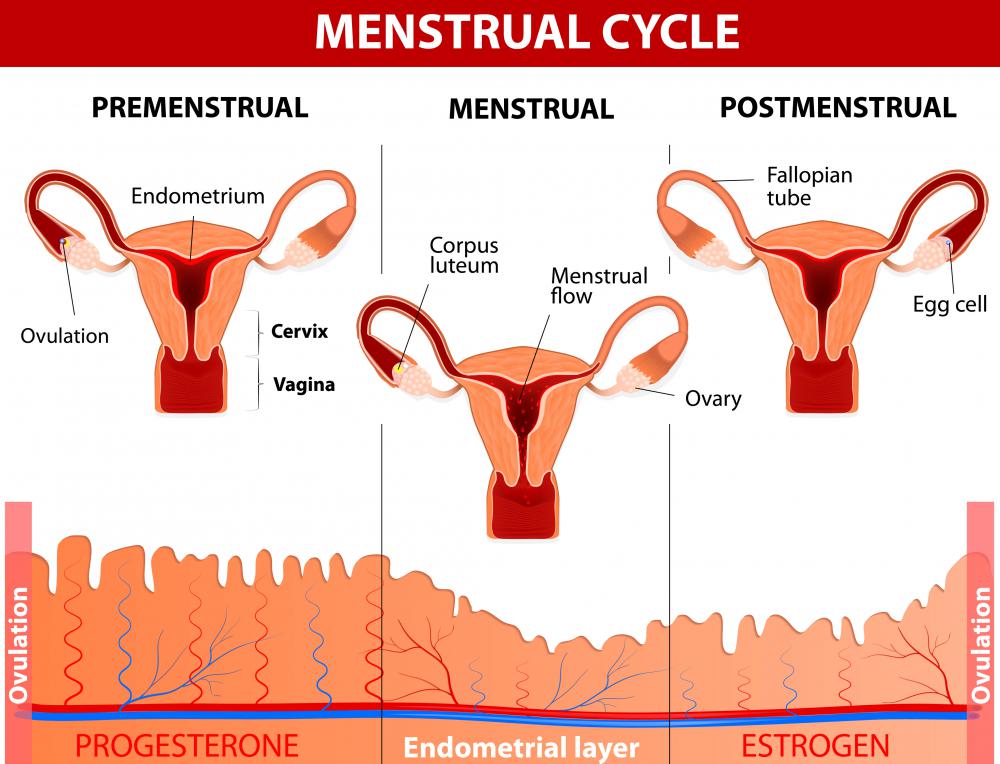At WiseGEEK, we're committed to delivering accurate, trustworthy information. Our expert-authored content is rigorously fact-checked and sourced from credible authorities. Discover how we uphold the highest standards in providing you with reliable knowledge.
What does a Missed Menstrual Cycle Mean?
There are a number of factors that can cause a missed menstrual cycle, or amenorrhea. Keep in mind that every woman is different, and that while the "standard" menstrual period occurs every 28 days, some women may have periods more or less frequently than that. It is also important to keep in mind that a "menstrual cycle" lasts for the entire month, so the term "missed menstrual cycle" it is actually referring to a missed period. A few of the factors that could cause irregular menstruation include pregnancy, illness, weight changes, or contraceptives, to name a few.
The first and most common cause of a missed menstrual cycle is pregnancy. It is important to behave as if pregnancy has occurred after a missed period, until a test can confirm or deny it. Begin with a home pregnancy test, and if the test shows a positive result, visit a doctor as soon as possible. Women who are breast feeding will also frequently skip periods.

However, another very common reason for a missed period is contraceptives, particularly the birth control pill and injection, as well as an intrauterine device (IUD). The birth control pill and injection alter the level of hormones present in the body, namely estrogen, which can impact the menstrual cycle. Additionally, even after stopping contraceptives, it can take a few months before the menstrual cycle rights itself and resumes a normal schedule. Hormone imbalances can occur even without taking contraceptives, so any concerns should be discussed with a doctor.

Significant weight gain or weight loss can also be contributing factors to a missed menstrual cycle. Though eating disorders such as anorexia and bulimia can frequently cause irregular menstruation, it is not necessary to have an eating disorder to have menstrual problems arise after significant weight changes. In addition to weight changes, other factors may include excessive exercise, stress, travel, and illegal drug use.

Illnesses, whether they are short or long-term, can contribute to a missed menstrual cycle, as well as problems with the pelvic organs. Medications are another factor, including antidepressants, NSAIDs, and others. Finally, during perimenopause, the menstrual cycle will change significantly, and menopause will cause the cessation of the menstrual period.

Typically, a missed menstrual cycle that is not caused by pregnancy is only temporary. If it continues, however, it is important to see a doctor to rule out any underlying medical causes. It may also be beneficial to keep track of the length of the cycle from month to month, which will be able to illustrate any patterns that may be able to indicate a cause for a missed cycle.
AS FEATURED ON:
AS FEATURED ON:
















Discussion Comments
@KoiwiGal - I do think the article author is right though in saying that the most obvious cause for a missed menstrual cycle is pregnancy. With the pregnancy tests you can get at the drug store these days there's no reason not to check this out.
Do remember that they aren't always accurate though. Getting tested by a doctor is by far the most reliable way of knowing what is actually going on.
But please don't ignore it if you might be pregnant. If you intend to keep the pregnancy, then you need to start taking care of yourself right away, as the developing embryo is most vulnerable to things like low folic acid levels and drinking when it is in its first few months. It might not seem to impact your life when it is that small, but it really should.
@Fa5t3r - I wouldn't worry too much but I wouldn't ignore it either. Just mention it to the doctor the next time you're there for something else so that he or she can check to make sure there isn't anything going on.
Otherwise, a missed menstrual cycle isn't usually something to be worried about unless you're usually completely regular and even then, I wouldn't be anxious unless I'd missed at least two of them or there were other symptoms. If, for example, you're experiencing pain or spotting without an actual period that can be a sign that you've got a cyst on your ovaries that should be removed.
It took over a year for me to get my menstrual cycle back after I got off the pill and even then it was still irregular for a couple of months. I don't think it's anything to panic over, and I think this information should be more widely available, because I had no idea it was normal for this to happen.
The same thing happened to my sister a few years later and she was convinced that she had cancer or was pregnant or something, until I told her that it just sometimes takes a while to restart.
Post your comments